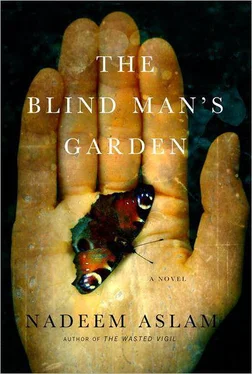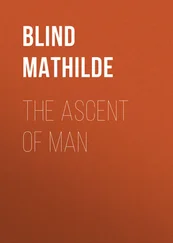‘How long have I been asleep?’
‘Five days. And I think the word is unconscious.’
‘Five days,’ he whispers. ‘This is your home?’
Akbar nods and places the animal on his chest and Mikal sits up and cradles it. The pads are like pink-grey raspberries attached to the undersides of its paws, and the fur has dark markings that look as though another cub with sooty paws has walked all over it.
‘It’s about three weeks old. My sister sent it in for you. In October, her husband and my twin brother and I went to fight the Western armies in Afghanistan. They were both martyred.’
Mikal remembers Akbar telling him at the brick factory that he had had nothing to do with fighting, that he was a taxi driver and the Americans had captured him in Jalalabad on false information.
He gets up and walks to the door and looks out, suddenly untired, desiring movement. The cub is pure innocent trust as it clings to him.
The house is painted yellow, and is located in a dense grove of trees, all the same kind. One of them grows in Rohan’s garden in Heer, its small green-white flowers filling the winter evenings with a rich smell. Rohan had planted it because its wood is used for making writing tablets.
‘It used to be a clinic,’ Akbar says, as they walk in the grove, the sun falling through the sieve of leaves here and there. ‘A small hospital, owned by a doctor in the 1930s. He planted these trees. He was famous in the region for providing wooden noses to the women whose real ones had been cut off by their families. The wood of these trees was used for carving the new noses.’
‘Where am I?’
‘South Waziristan. The clinic was abandoned when it was discovered that it had links with English missionaries.’
The new pale leaves stand out against the darker foliage brightly.
‘I won’t ask you your name,’ Akbar says. ‘I know you’ll tell me when you are ready.’
Mikal nods.
‘The men you shot,’ Akbar says. ‘Do you think they are dead?’
‘They couldn’t have survived.’
‘I know what charges the Americans will bring against you. I telephoned a friend in Peshawar and he looked it up.’
‘Tell me.’
‘Are you sure?’
‘Yes.’
Akbar takes a piece of paper from his pocket and unfolds it. ‘Let’s assume they didn’t die. For each wounded man you will be put on trial for one count of attempting to kill US nationals outside the United States. One count of attempting to kill US officers and employees. One count of assault of US officers and employees. One count of armed assault of US officers and employees. One count of using and carrying a firearm during and in relation to a crime of violence …’
‘How long?’ Mikal interrupts.
‘You will go to prison for almost two hundred years.’
‘And if they have died?’
Akbar looks at him, his eyes containing the answer.
Mikal places the cub on his knee and it lifts a paw as if to test the air, the soft leather nostrils expanding.
‘I thought they were about to kill me.’
‘I know.’
Silently they walk back to the room where two male servants are setting out dishes for their lunch, both of them with rifles over their shoulders, the straps decorated with small coloured beads and sequins.
Corn bread drenched in clarified butter, yogurt, a dish of chicken and spinach, another of lentils and potatoes, sliced onion in a saucer, oranges. A large bowl of custard with a layer of coin-like banana slices on top. Akbar sends the custard back to remain cool in the fridge until they call for it.
A few minutes into the meal Mikal says quietly, without looking up from his plate, ‘There is no way out of it, is there?’
‘I don’t know.’
‘There isn’t. They won’t ever stop looking. They’ll be trying to find me in twenty, thirty, forty, fifty years.’
‘It’s strange how much their government cares if something happens to its people.’ With a morsel of bread in his hand, Akbar extends his arm and touches Mikal’s shoulder with the back of his wrist. ‘You’ll just have to make sure they can’t find you.’
‘I don’t understand how I could have smelled the sulphur of the bullets fired from the mosque. The rotor blades should have dispersed the smell. But I smelt it. I don’t know how it’s possible.’
The leopard is perched on Mikal’s knee as he eats. They descend trees head first and he imagines the cub moving down his shin towards his foot.
‘I don’t want you to feel any guilt about it,’ Akbar says. ‘You are even with the Americans for what they did to you.’
‘They didn’t kill me.’
‘They’ve killed plenty of others.’
‘That’s not how it works. Not with me.’
*
The yellow house is just over a mile from the town of Megiddo. The town was ransacked by the British on three occasions during the Raj, the last when they were fighting the Fakir of Ippi, Akbar’s maternal grandfather, the guerrilla leader who fought a war against the British from 1935 onwards and killed thousands of soldiers in numerous pitched battles, demanding nothing but the infidels’ withdrawal — we want neither your honey nor your sting . It was said that he had supernatural powers and could predict when the British were about to attack so he could vanish long beforehand. The British convinced a few members of the clergy to speak out against him in the mosques but it was to no avail. His support and appeal continued to grow steadily, Muslim soldiers having to be court-martialled for not shooting straight at him and his fighters, or for leaking plans of attack to him. Muslim brigadiers in the British army would leave ammunition for their hero in prearranged places.
In 1940 Adolf Hitler sent two German advisers to improve the Fakir’s gun-making and help him in guerrilla training. He was the most logical person for the Axis powers to have approached in this region, in order to spread mayhem for the British in the tribal belt of their own colony. It had taken a whole year to establish contact with the Fakir and he had informed his prospective German allies that he would require a sum of £25,000 every month to keep undermining the British, as well as supplies of weapons and ammunition. The support of the Germans ended eventually, when Germany attacked Russia and it became impossible to send in the necessary arms.
The war in Europe came to a conclusion but the fighting against the enemies of Islam in the wilds of Waziristan continued. By 1947, forty thousand British troops were arrayed against Akbar’s grandfather as he hid in caves and forests and ravines, turning sticks into guns and pebbles into bullets with Allah’s direct help, some of the stone bullets still owned by Akbar’s family.
For a long time the town of Megiddo was one of the region’s major weapon-producing centres, the local clans manufacturing their guns from the iron they smelted there. Within days Mikal learns that the talk of weaponry is more or less constant in the house, the young men proposing a shooting competition a minute after meeting him.
Behind the yellow house, one dawn during the second week of his recovery, Mikal finds a courtyard that is an expanse of scrap metal, old car doors and transmissions, rotting hubcaps and castoff motor parts lying at the base of those saptaparni trees. There are empty rocket shells from the war years in Afghanistan.
The grass is clogged with dew and out of it three enormous Airedale dogs stand up at his approach long before he notices them, revealing legs that have been dyed with henna to keep them cool. Aggression has clearly been bred into them but they are chained to the tree trunks and he lets the leopard cub walk beside him in the dawn light, its fur tinted by the orange light where it is dry, darker where the dew has wet it. Its calls resemble the thin notes of birds.
Читать дальше












